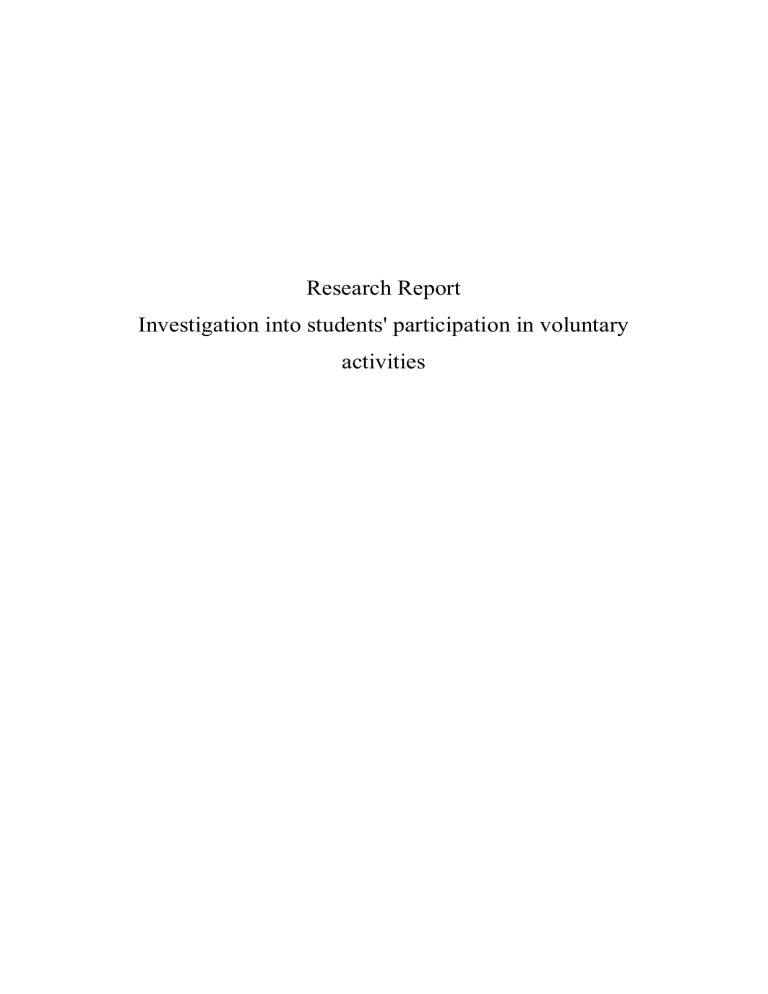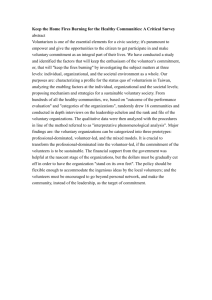Investigation into students' participation in voluntary activities
advertisement

Research Report Investigation into students' participation in voluntary activities 1.Abstract Community volunteer program aims to stimulate students to participate in voluntary service and benefit from it while helping others. This article compares the research and investigation reports of different scholars. The relevant data shows that the main reasons that whether students participate in voluntary activities are influenced by egoistic motivation and altruistic motivation. Regarding the advantages of participating in voluntary service, views of those who participate in voluntary activities are significantly different from those who do not. This article also researches the obstacles that hinder students from participating in voluntary service and puts forward suggestions on listing the voluntary service as elective courses and setting up training programs to encourage students to participate in voluntary work. 2.Introduction As voluntary service is increasingly valued, more and more activities are held by governments and universities to attract students to join the volunteer team. A good example is that many universities have launched community volunteer program. Participation in voluntary activities is also considered by the universities as a necessary condition for increasing students’ social participation (Hustinx et al. 2008). This article is written at the request of the university to research students’ motivations who work as volunteers and what they can gain from it, to let students know more about voluntary service and help them take part in the community volunteer program. 3.Findings 3.1 The motivations of volunteers The motivations of volunteers can be divided into three categories, namely Egoistic Motivation, Altruistic Motivation and Mixed Motivation (Winniford et al. 1997). 3.1.1 Egoistic Motivation As one of the most important motivations for taking part in voluntary service, students who have this kind of motivation want to obtain work experience, master new knowledge that can help them in their study and future work (Holdsworth & Quinn 2010). In addition, recent research shows that more and more students want to get rid of negative emotions and maintain a positive mental state by participating in voluntary activities. At the same time, students also hope that they can enrich their resumes and make new friends by participating in voluntary activities, which are also important factors. 3.1.2 Altruistic Motivation Different from people who work as volunteers because of egoistic motivation, most students participate in voluntary activities for the first time because of the influence of altruistic motivations, which means they want to help others through voluntary service. In the process of helping others, they will gain joy and a sense of accomplishment, which makes them more actively participate in voluntary activities. According to a survey report (Table 2) involving a total of 4,000 students from 5 countries, the factor that thinks it is significant to help other people is the main motivation for all student groups to participate in voluntary service (Smith et al. 2010). 3.1.3 Mixed Motivation Although the motivation for most students to participate in voluntary activities for the first time is altruism, whether they are willing to continue work as volunteers is also related to egoism (Batson 2014). In other words, students are more likely to carry on participating in voluntary service if they could get something that helps them through voluntary service. 3.2 The benefits for students to work as volunteers The reason why most students participate in voluntary activities is because they want to help others rather than in return. But there is no doubt that participating in voluntary service can subtly bring benefits to students. Many studies have proved that participating in voluntary service can not only improve students' performance in studying but also make them more willing to contribute to society. Furthermore, students can get in touch with real work in advance through voluntary activities, which can help them gain work experience to let them better adapt to their future work (Holdsworth 2010). According to table 3, more than 70% of students with volunteer experience think that participating in voluntary activities can learn new skills, gain work experience and self-satisfaction (Smith et al. 2010). 3.3 Factors preventing students from becoming volunteers In spite of the number of student volunteers are increasing in recent years, however, students also face some difficulties in participating in voluntary activities. For example, a lot of their time is occupied by homework and theory courses because they have to earn enough credits for completing the course to meet the graduation requirements. In addition, some people also think they lack experience and confidence to become qualified volunteers. (Francis 2011). 4. Conclusion To conclude, this report shows why students want to work as volunteers and what they can obtain from it. Altruistic motivation is the important reason for most students to take part in voluntary service among all motivations though students’ willingness to continue volunteering depends to a certain extent on egoism. In terms of benefits, students are all believe that participating in volunteers is beneficial to gain work experience and learn skills. This article also studies that lack of time and confidence are important factors that hinder students from participating in voluntary activities. Through these studies, universities can better help participants to take part in voluntary activities. 5. Recommendations It is worth noting that as the government and schools pay more attention to stimulate students to join voluntary organization, more and more students work as volunteers. However, as mentioned above, there are still many obstacles which influence the students’ participation in voluntary service. Therefore, this report makes the following recommendations. 1) List the voluntary activities as elective courses Many universities students have to spend much time on studying because they have to achieve enough credits to graduate. Given this situation, universities can list voluntary activities as elective courses and students can get credits for participating in voluntary service, which can allow students more time and willingness to participate in voluntary service. 2) Set up training programs for student volunteers Although most of universities are now advocating students to participate in voluntary service, many students are still worried that they lack sufficient experience and confidence to be qualified as volunteers. The programs arranged by the university can not only enable more students to master the basic skills of volunteers, but also allow them to understand the significance of take part in voluntary activities. At the same time, universities can also invite students who have participated in voluntary service to share their volunteer experience in the training programs, which can make other students more interested in voluntary activities. Reference list 1) Batson, CD 2014, The altruism question: Toward a social-psychological answer. Psychology Press. 2) Francis, JE 2011, ‘The functions and norms that drive university student volunteering’, International Journal of Nonprofit and Voluntary Sector Marketing, vol. 16, no. 1, pp.1-12. 3) Holdsworth, C 2010, ‘Student volunteers: A national profile’, Keele University: Volunteering England. 4) Holdsworth, C & Quinn, J 2010, ‘Student volunteering in English higher education’, Studies in Higher Education, vol. 35, no. 1, pp.113-127. 5) Hustinx, L, Haski-Leventhal, D & Handy, F 2008, ‘One of a kind? Comparing episodic and regular volunteers at the Philadelphia Ronald McDonald House’, International Journal of Volunteer Administration, vol.25, no. 3, pp.50-66. 6) Moore, E, Warta, S & Erichsen, K 2014, ‘College students' volunteering: Factors related to current volunteering, volunteer settings, and motives for volunteering’, College Student Journal, vol. 48, no. 3, pp.386-396. 7) Smith, K, Holmes, K, Haski-Leventhal, D, Cnaan, RA, Handy, F & Brudney, JL 2010, ‘Motivations and benefits of student volunteering: Comparing regular, occasional, and non-volunteers in five countries’, Canadian journal of nonprofit and social economy research, vol. 1, no. 1. 8) Winniford, JC, Carpenter, DS & Grider, C 1997, ‘Motivations of college student volunteers: A review’, Naspa Journal, vol. 34, no. 2, pp.134-146.
